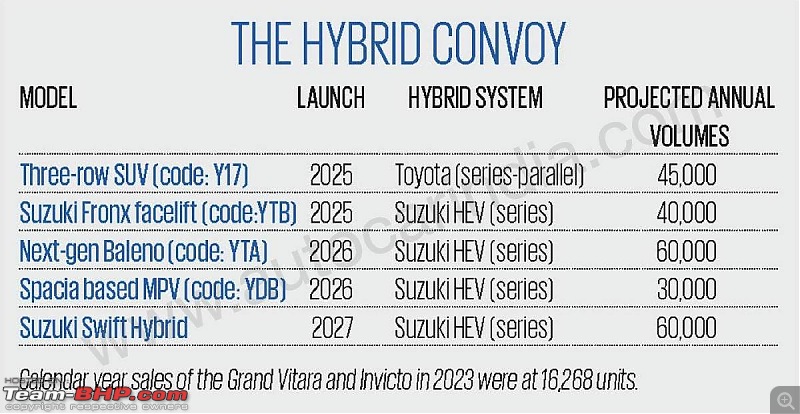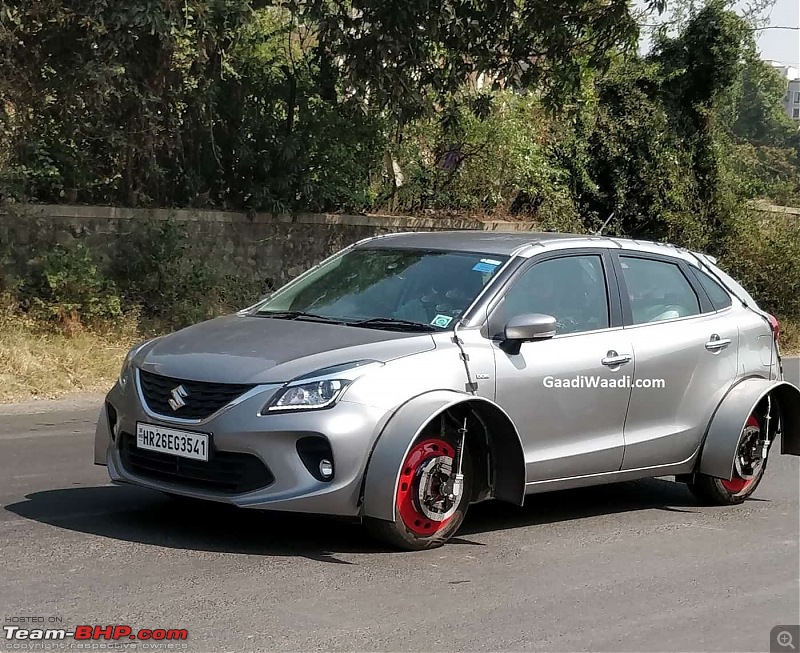Team-BHP
(
https://www.team-bhp.com/forum/)
Maruti to go mass market with hybrid tech. Ditching the Toyota parallel hybrid system for a series hybrid or a range extender is the key to keeping costs low.
Will not depend on tax benefits for Hybrids as this system is relatively cheaper than the parallel hybrid system.
To offer over 40km per litre; powered by Suzuki's in-house series hybrid tech. Swift, Baleno and new launches to be launched in Hybrid variants.
Quote:
The big news is that Maruti Suzuki has huge plans to exponentially increase hybrid volumes with offerings in mass segments using hybrid variants of the Fronx, Baleno, Swift and a small MPV, which are all under development. The masterstroke, however, is that the company won’t use Toyota’s series-parallel hybrid system but is instead developing an in-house and cheaper series hybrid powertrain that is essentially a range extender.
|
Maruti Suzuki’s new series hybrid powertrain (code: HEV) will be significantly cheaper to produce than a series-parallel and parallel-only hybrid, which is the main reason why the carmaker chose this route to counter the inherent high cost of a powertrain that includes an IC engine, electric motor and battery
. Also, the government has thus far refused to give hybrids any tax benefit and the high rate of 43 percent GST compared to just 5 percent for EVs is the main cost barrier. To reduce the cost impact, Maruti Suzuki has found a solution with a series hybrid. Series Hybrid: Quote:
The petrol engine in a series hybrid system serves only as a generator or range extender, thus instead of directly propelling the vehicle, it produces electricity to power an electric motor that, in turn, drives the wheels.
It is, thus, relatively simple because the electric motor is the only power source driving the wheels – just like in an EV – and the motor draws electric power from either a small battery pack or from a generator run by the petrol engine. The series hybrid system is also called a range extender hybrid because the IC engine acts as a generator to keep recharging the EV’s battery pack.
|
 Advantages of a series hybrid
Advantages of a series hybrid Quote:
There are several advantages of a series hybrid, which makes it attractive as a mass-market option. Firstly, the absence of a direct mechanical link between the IC engine and wheels simplifies the overall design of the powertrain, thereby making it a more cost-effective hybrid solution, as well as potentially reducing maintenance costs, and improving reliability – all prerequisites of the small-car segment.
With less mechanical losses, the layout in a series hybrid system offers optimised efficiency in city driving, with the system excelling in stop-and-go traffic scenarios, typical of urban driving environments.
However, series hybrids are not particularly efficient on the highway, since the electric motor is the primary source of propulsion, the internal combustion engine (ICE) may need to work harder to generate electricity. So, for long-distance driving, parallel hybrids can be more efficient at higher speeds and constant loads, since both the internal combustion engine and the electric motor can work together to propel the vehicle.
So, though the parallel hybrids feel nicer to drive, they require more complex transmission systems to allow both the internal combustion engine (ICE) and electric motor to drive the wheels independently or together. This complexity is one of the main reasons why parallel hybrids are more expensive.
|
Maruti Suzuki’s hybrid system :
The power source for Maruti Suzuki’s new range of HEV-based series will be the all-new Z12E, three-cylinder engine. The compact Z12E will act as a generator to charge a 1.5-2kWh battery pack or drive an efficient electric motor that, in turn, drives the front wheels.

Quote:
Maruti Suzuki’s HEV series hybrid powertrain will debut in the facelifted Fronx (code: YTB) followed by the next-gen Baleno (code: YTA) in 2026. The next-gen Swift (code: YEA), which is due for launch in the first half of this year, is also expected to come with a hybrid option, though not before 2027. So until then, this very popular hatch will be a petrol-only model. Other models in line for the HEV system are the Spacia-based compact MPV (code: YDB) and the next-gen Brezza, which will come with hybrid power only in 2029.
By the end of the decade, Maruti Suzuki could have as many as over half a dozen models and models with a potential volume of eight lakh units per annum or 25 percent of its total volumes powered by hybrid tech, which includes Toyota’s 1.5-litre parallel-hybrid powertrain and its own HEV 1.2-litre series hybrid system.
|
Maruti Suzuki hybrid fuel efficiency:
In a series hybrid, as the engine only runs to produce electricity and never directly takes on the driving load, it is most often running in the prime fuel-efficient rev range. Hence,
Maruti’s HEV-powered cars are expected to give exceptional fuel economy to the tune of 35-40kpl on the test cycle and will also be a key technology to meeting future CAFE targets, which are due to get stricter in 2027.
But in the hybrid race, it is quietly zooming ahead whilst most of its rivals don’t even have a plan. And in this decade, the hybrid race could turn out to be the most important one to win.
Source:
Autocar India
Kudos for bringing proper hybrids to the affordable segments!!!
Waiting to see how they price it and how the driving experience would be.
Will it be like the Honda system with an engine mode at higher speeds? Or will this be a pure series hybrid system? Already the series hybrid system would be weirder to drive than a parallel hybrid system. Add to that, trust Maruti to tune it for even more fuel efficiency, killing whatever driving joy there is.
Waiting to see how the Spacia based MPV turns out to be.
Wonder why they don't just make an EV since the 5% tax rate is a massive advantage, even with the high price of batteries.
Quote:
Originally Posted by DicKy
(Post 5715247)
Kudos for bringing proper hybrids to the affordable segments!!!
Waiting to see how they price it and how the driving experience would be.
|
Exactly, I am waiting for the 3 row HEV and will replace my XL6 (6 speed auto) with it. The hybrid powertrain will provide enough torque fill at the lower end and amplify the fuel economy to crazy levels! Though my commuter will remain as the Baleno as it is very efficient and getting 22 km/l in the city. Perhaps an HEV hatch in 2027..
HEVs make so much more sense currently in our market. EVs are very efficient but HEVs are so much better especially with current efficient petrol powertrains. The range, peace of mind and EV mode make it a perfect combination) at least for me).
So to be clear on my understanding there will be an ICE engine which will act as a generator which will charge the battery and the battery will be connected to the motor which will drive the wheels. Am I correct or I have got it wrong?
Quote:
Originally Posted by delusional_fool
(Post 5715390)
The article talks about a completely series hybrid system but this video seems to be about a series-parallel hybrid. I'm confused which approach Suzuki is taking.
|
Looks like it will be the series type as the article mentions clearly that the engine will act only as a generator to power the electric motor & battery. Its more like a 'Range Extender' concept we learnt during Mech Engg days.
Finally,
This is so sensible and honestly the need of the hour. The Toyota/Honda hybrid systems are too complex and costly.
All you need is an EV and a built-in generator.
This will truly revolutionize the small car market in India.
Seems to me if Maruti is betting on hybrids this much, hopefully hybrid tax will be decreased soon. It can't be a coincidence that Maruti starts investing in hybrids this heavily and GOI lowers the tax. I believe my prediction will come correct.
Seems the Hybrid components have now been localized and the technology is streamlined for production.
Remember Maruti Suzuki's last tests seen on the 'HYBRID' Baleno were in 2021.
Link: 

Excuse my tenuous understanding, but is this "series hybrid" basically an EV with a generator onboard? Has anyone driven one before, and is there any increasing relation between accelerator input and engine RPM or does the engine just power up when the battery is low?
If this Series Hybrid news is true, then it is a new development unlike anything Suzuki has developed till date including the video share in this thread. That is the traditional Hybrid that Suzuki has which powers the Vitara in Europe. That has existed since a long time. And this would definitely not be a Range Extender or a PHEV version.
The Series Hybrid vehicles are rare and definitely not as efficient as the one from Toyota but are lower in cost but not by a very significant amount. I had heard of murmurs about a new Suzuki Hybrid but had no idea it was a series hybrid.
And yes, I definitely don't wish that Suzuki gets any tax benefits from the sake of hybrids because these vehicles are going to be north of INR10 Lacs and is definitely not an affordable car that a true common man can buy in India. And the ones who can, do not deserve subsidies.
Having worked on Formula Hybrid Cars in my college days, Series Hybrids are typically a lot easier to implement, and cost significantly less than the parallel ones. We used a engine that used to run at a fixed RPM, connected to a motor, which charged a battery, and which ran a motor connected to wheels. So it was essentially a Range Extender EV. It had regen as well, and brake energy recuperation to charge the battery too.
The video posted here is NOT a series hybrid, since we see the engine powering the wheels. I won't be surprised to see Maruti market it as a infinite range EV, similar to what RAM is doing with its
1500 Electric Truck.
What exactly will be the benefit of this over a simple petrol car? The car will carry a much heavier power-train setup (due to ICE engine + battery pack + motors + associated heavier suspension components).
It will also keep running the engine at a fixed RPM to generate enough power to charge the battery pack. I.e. - even on idle / low speed - the engine might run at higher rpm than an idling petrol engine? Or it shuts the engine down during stops (that would be counter productive as the battery can be charged while stationary as well). This will offset emission gains of an EV mode as well.
No way the car will be "cheap" to buy. It will be marketed as a "Hybrid", and I am not convinced the fuel efficiency difference will be able to justify the price premium easily. Not to forget - this car will also need the ICE car's routine service expenses for engine oil, filters, timing, ignition kit / spark plugs and the whole shabang.
I feel these attempts at selling products to the customers while some buzzwords are hot in the market, are a bit opportunistic. I'd rather go the full EV way for my car, or stick to a simpler & reliable ICE car (including Maruti's own options) till there is a better alternative. This kind of "neither here, nor there" engineering has never impressed me personally. Of course, I'd love to be positively surprised by Maruti by this being some brilliant set of products with great innovation.
Quote:
Originally Posted by Reinhard
(Post 5715567)
It will also keep running the engine at a fixed RPM...
|
35km/litre is a very sweet deal, perhaps the sweetest deal before full electrification, for heavy users.
| All times are GMT +5.5. The time now is 14:35. | |





